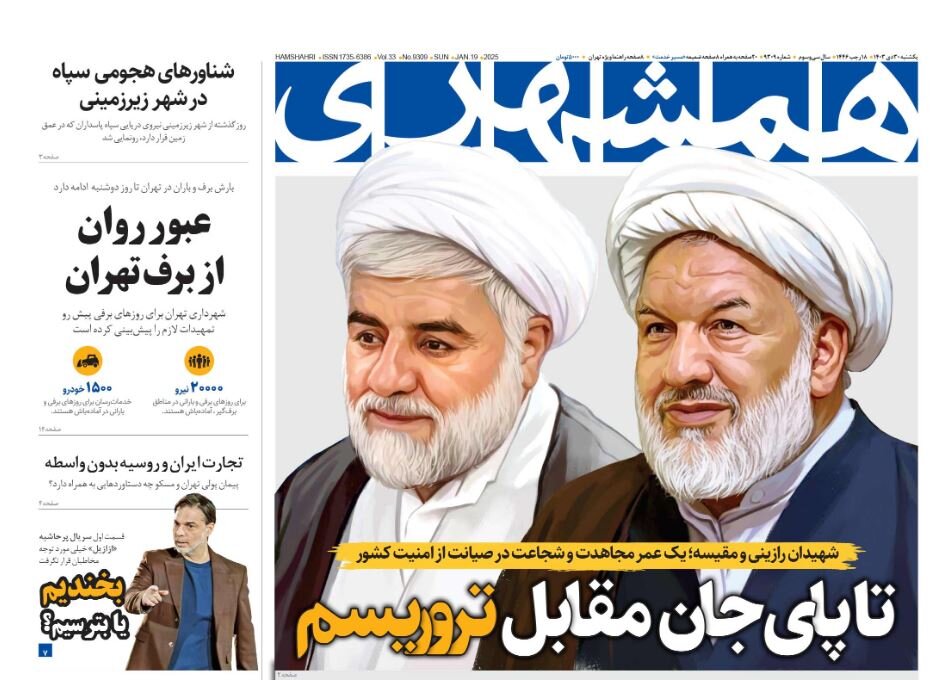Assassination is never a successful way to eliminate the opponent

TEHRAN - In a note, Hamshahri discussed the assassination of two senior judges in Tehran and wrote: Terrorists believe that by assassinating the leaders of the opposition side, they can remove obstacles and achieve their goals without any resistance.
From the first days of the victory of the Islamic Revolution, anti-revolution groups used terror as a tool to confront the Islamic Republic. The MKO group carried out assassinations against key figures of the revolution and these actions triggered a full-scale war against the Iranian government and people. History has shown that terror never leads to lasting power. Even if personal motives are not involved, it should be analyzed in the context of failed attempts to eliminate the competitor. Such measures only shorten the life of terrorist groups and do not postpone their final defeat. This narrative is a proof that true power is obtained through justice, service to the people, and harmony with God's will, and not through terror and violence.
Resalat: Gateway to world trade
In an article, Resalat discussed the vital role of ports in the growth of the sea-based economy and global trade and said: Maritime transport is one of the most important pillars of international trade and one of the most basic economic tools for countries having access to the sea. The Islamic Republic of Iran also has a high potential to become one of the major maritime transportation hubs at the regional and international levels given its strategic geographical location and important ports on the northern and southern coasts. The country's ports, especially on southern coasts, as the main gateways for the import and export of goods, have many capacities that, if optimally exploited, can lead to significant growth and development in various economic sectors. By strengthening infrastructure, improving resource management, attracting large investments, and using new technologies, we can increase foreign trade, reduce transportation costs, increase employment, and improve the country's economy.
Iran: Iraq as a mediator
The Iran newspaper investigated Baghdad's moves in interactions between Iran and the United States and the management of new developments in the Middle East. It said: Iraqi officials have raised positions in recent weeks to take steps in a diplomatic process to reduce the crisis between Iran and the United States. The important aspect of this role-playing is the effort to exchange messages between Iran and America. Iraqi leaders believe that improving relations between Iran and America can contribute to development goals and political stability in Iraq. The Sudani government is trying to set a successful goal in regulating the relations between Iran and America. In the meantime, Sudani's hope for the success of this strategy is the shared opinion of Iran and America on the "necessity of security and political stability in Iraq". Although the nuclear issue has been the main point of confrontation and tension between Iran and America for more than 2 decades, Iraq sees its capacity to mediate in resolving regional issues to strengthen its internal security and stability.
Ham Mihan: JCPOA is on an ambiguous path
In a commentary, Ham Mihan pointed to the JCPOA and wrote: Some of Iran's (nuclear) limitations within the JCPOA expired in 2023, however, the Biden administration imposed new sanctions against Iran's ballistic missile program and drone industry, and the European Union also refused to suspend or stop the sanctions. Designating the Islamic Revolutionary Guard Corps as a terrorist organization by the United States was one of the obstacles for Washington to rejoin the JCPOA. American officials also said that more nuclear advancements by Iran could make it impossible to return to the initial agreement, and now with the return of Donald Trump, implementing the terms of the JCPOA is facing serious doubts. Although the JCPOA agreement is still legally valid and only the United States has withdrawn from it, in practice both Tehran has violated its nuclear commitments and Europe has refused to cancel its sanctions, and there is no guarantee that Europe will not take action to activate the trigger mechanism. If it happens, it will also face a serious challenge to the legal achievements of the JCPOA.
